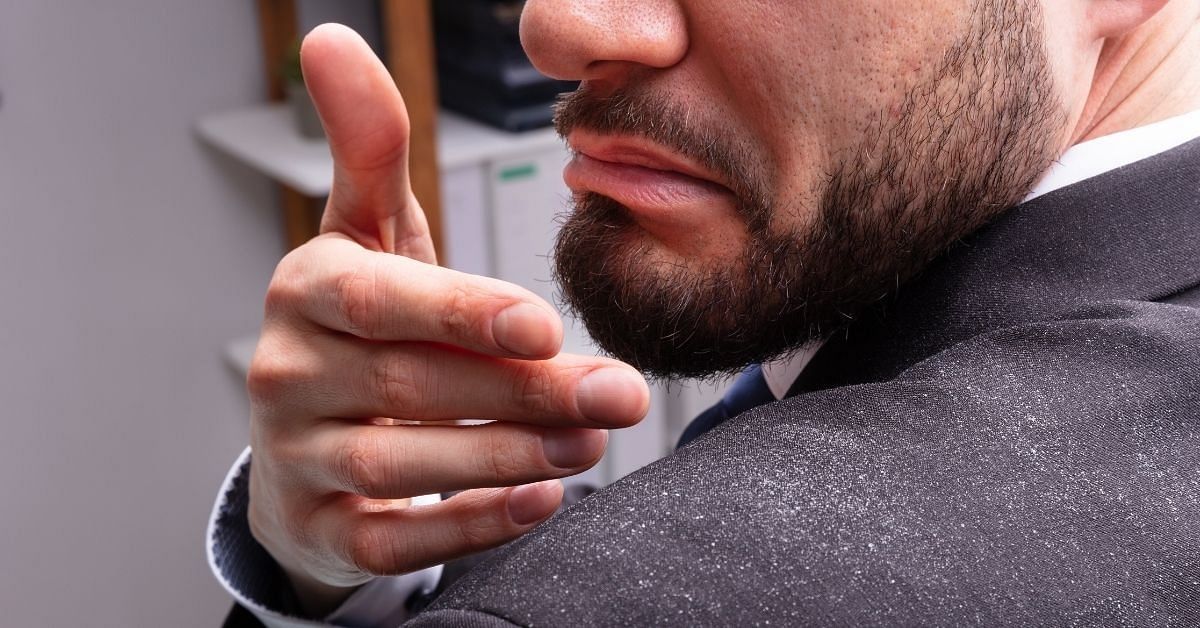Is Dandruff Contagious? - Evidence Backed Answer!
Are you suffering from dandruff? Do you wonder this might be due to dandruff from some other person? Read on to see if this might be true!

What is Dandruff?
Dandruff (scientifically referred to as seborrhoeic dermatitis) is a condition that causes the skin on the scalp to form flakes and then shed as dead cells. Due to the faster emission rate, you can see dandruff on your hair and clothing.
Is Dandruff Contagious?
No, dandruff is not contagious or infectious. However, its severity and intensity can make it look like your dandruff is increasing and spreading. If you have a fungal or yeast infection, then the area of visible dandruff is more.
There is a category of dandruff known as ‘walking dandruff’ or cheyletiellosis, primarily found in cats and dogs. The cheyletiella mites can transmit dandruff to humans. So, is this type of dandruff contagious? Yes, it indeed is.
Dandruff can spread to other parts of your body when it is all over your scalp. For example, you may find dandruff along your nasal folds, back, and other contact places. Still, wondering if dandruff is communicable? The answer is yes; it can spread around your own body.

Does Dandruff Cause Hair Loss?
Dandruff does not contribute directly to hair loss. However, severe dandruff can cause extreme itching that may damage your hair follicles. This could lead to hair loss.
How do I Prevent Dandruff for Good?
Worried that dandruff is contagious and wish to get rid of it for good? Here are some tips to prevent dandruff.
1. Medicated Shampoo
Use a dandruff shampoo containing the following ingredients:
- Pyrinthione zinc
- Salicylic acid
- Ketoconazole
- Selenium Sulphide
The shampoo needs to be on your scalp for 10 minutes to give the product enough time to work.
2. Tea Tree Oil
Combine some tea tree oil with any carrier oil to prevent dandruff. Use it as a massage oil, shampoo, or shower gel. Tea tree oil contains moisturising and antifungal properties that prevent dandruff effectively.

3. Moisturise
Your scalp needs good hydration if you want to keep dandruff at bay. That is possible with coconut oil since it has antifungal and moisturising properties. However, avoid using abundant oils on your scalp, which may worsen your condition.
4. Say No to Irritants
Your hair and scalp are sensitive, and you need to avoid certain irritants like:
- Natural or artificial fragrance
- Bleach
- Detergents
- Formaldehyde
5. Manage Stress
Stress weakens the immune system and makes your scalp more sensitive to fungus. Manage stress using relaxation techniques like:
- Yoga
- Meditation
- Take a walk
- Controlled breathing
6. Get a Little Sun
Do not avoid the sun due to the fear of premature ageing or skin cancer. Sunlight helps fight against dandruff. Ensure that you wear sunscreen before venturing out.
How to Get Rid of Dandruff: Remedies
Although there is no cure for dandruff, you can get rid of dandruff by understanding the root cause of the condition.
- If your dandruff is due to a lack of moisture, then you need to work on hydrating your scalp.
- If a fungal infection causes your dandruff, you need to tackle that first.
Worried if dandruff is contagious? No, it isn’t. Here are some home remedies that will help you get rid of your dandruff.
- Aloe Vera: Rub it on your scalp before shampooing.
- Apple Cider Vinegar (ACV): Add a few tablespoons of ACV to your shampoo or mix it with essential oils and spray it on your hair.
- Baking Soda: After wetting your hair, put the baking soda on your scalp. Keep it for a few minutes before rinsing it out.
- Lemon Juice: Rub two teaspoons of lemon juice into your scalp. Let it settle and rinse after a few minutes. Follow it up by pouring lemon juice mixed with water on your scalp.
- Olive oil: Rub several drops of olive oil into your scalp. Put on a shower cap through the night. Shampoo your hair in the morning.

When to Contact a Doctor?
- If your condition worsens and causes severe itching, redness, or shedding of skin.
- If the above remedies fail to work on your dandruff.
References
- What is dandruff? - https://www.medicinenet.com/is_dandruff_seborrhea_contagious/article.htm
- Dandruff - https://kidshealth.org/en/teens/dandruff.html
- Seborrheic Dermatitis - https://my.clevelandclinic.org/health/diseases/14403-seborrheic-dermatitis

